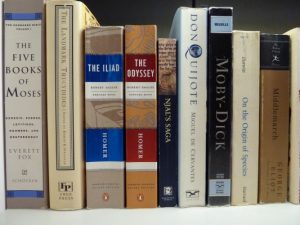Yuri Herrera’s Signs Preceding the End of the World
The Salon Intensive offers a one-meeting study that ambitiously takes an entire work in one big, energetic gulp. Participants have described this as a wonderfully dynamic approach– we work hard and have a joyous time.
The Salon welcomes the proposal of new works — especially ones that give a fresh view on the struggles that currently challenge our humanity. The face of the migrant is too easily perceived as something beyond normative experience — although most of us are, in one way or another, migrants. Any work that humanises the struggle to cross borders and negotiate antagonistic attitudes (authorities as well as imbedded prejudices) argues for a worthwhile read: a work that evokes mythical themes and offers the challenges in lyric writing is particularly compelling.
A few reviews of Signs Preceding the End of the World:
“[T]his marvellously rich, slim novel is working on many levels . . . Herrera’s great achievement lies in elevating the harsh epic of “crossing” to the “other side” to soaring myth. There are allusions to Odysseus, Orpheus and the Styx, the river of Greek mythology that was a border to the Underworld; as well as Mesoamerican stories of shapeshifting and rebirth . . . Herrera’s metaphors grasp the freedom, and the alarming disorientation, of transition and translation . . . Translator Lisa Dillman has found a language both blunt and lyrical for Herrera’s many neologisms.” —Maya Jaggi, The Guardian
“This is a gorgeous, crisp little thing. And although Signs . . . is no epic – accounting for chapter breaks it clocks in at under 100 short pages – Yuri Herrera has managed to achieve such extraordinary scope, of space and meaning, without any sense of hurry or clutter … Signs… is an important work, given the tenor of the immigration debate in the US and internationally. Herrera and Makina make a mockery of old-order American patriotism, which is easy to do but tough to actually pull off. The whole book is in fact a tiny exercise in bold and clever writing done with verve.” —Angus Sutherland, The Skinny
And this one from reader Mark Aronson:
“Borders challenge. The hard ones are two sided, divided by walls, iron spikes, barbed wire, guard towers. Others are soft and shift, they meander in attitude at the river’s edge, easy to cross, when no one cares. Still many are not obviously one or the other, like the vague but definitive line that separates Mexico from its northern neighbor the USA.
“Yuri Herrera’s nine brief chapters in “Signs Preceding the End of the World,” explores the US – Mexican border in magical, mythical and meaningful ways. Herrera’s protagonist Makina, stands as a female Orpheus, thrust into the underworld in both literal and figurative ways as she makes a crossing north in search of her lost brother. Her journey is aided by the host of characters one might expect to find in such journeys; boatmen, dealers, coyotes, thieves, border guards, “patriots,” and the ever present anonymous yet sympathetic peoples who have survived this contemporary middle passage and understand her journey’s goal. They help their sister on her way.
“Makina’s intelligence, bilingualism and street smarts facilitate her quest, as she is able to translate and negotiate the many riddles and personalities that aim to confound her mission. She knows when to fight, when to duck, and when to cross her fingers. The story’s Sphinx, arrives in the guise of a patriot vigilante border patrol, whose virulent hatred of migrants, is subdued with the direct forceful confusion of her crossings’ explanation.
“Makina offers the patriot his riddle’s answer complete with its neither yes nor no ambiguous edge:
“We are to blame for this destruction, we who don’t speak your tongue and don’t know how to keep quiet either. We who didn’t come by boat, who dirty up your doorsteps with our dust, who break your barbed wire. We who came to take your jobs, who dream of wiping your s***, who long to work all hours. We who fill your shiny clean streets with the smell of food, who brought you violence you’d never known, who deliver your dope, who deserve to be chained by neck and feet. We who are happy to die for you, what else could we do? We, the ones who are waiting for who knows what. We, the dark, the short, the greasy, the shifty, the fat, the anemic. We the barbarians.”
“Herrera’s story is a provocatively rich read, enigmatic and forceful. The English translation is wonderfully navigated by Lisa Dilman who has provided, and explained at story’s end, an earnest gist of the Mexican vernacular Spanish, avoiding the pitfalls of direct word for word matching, instead suggesting meanings into the English she offers as a poetic inquisitive take on Herrera’s contemporary story.
This a good book, and then some.”








